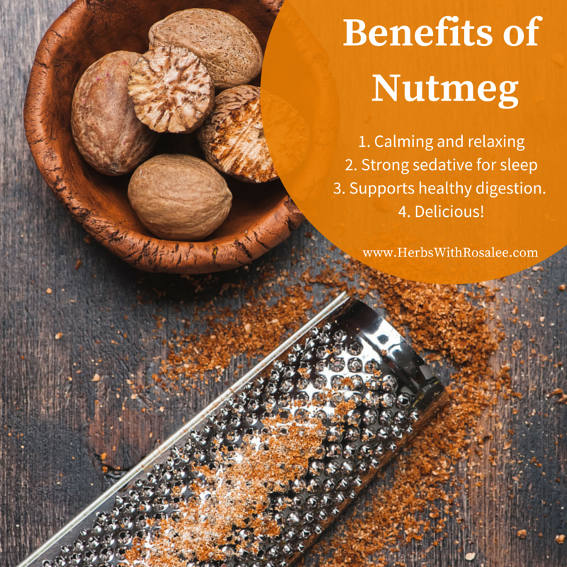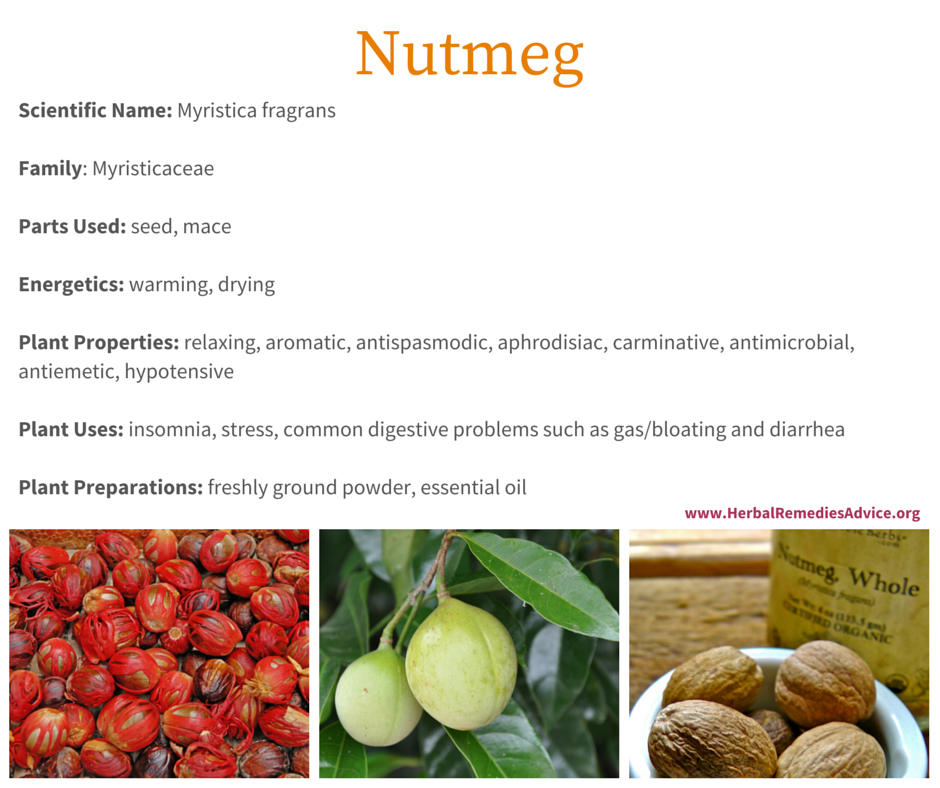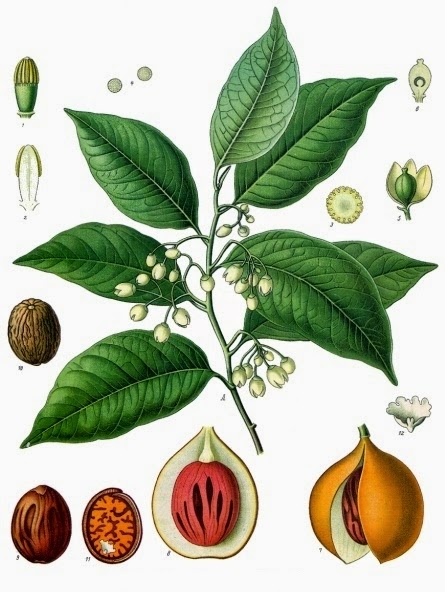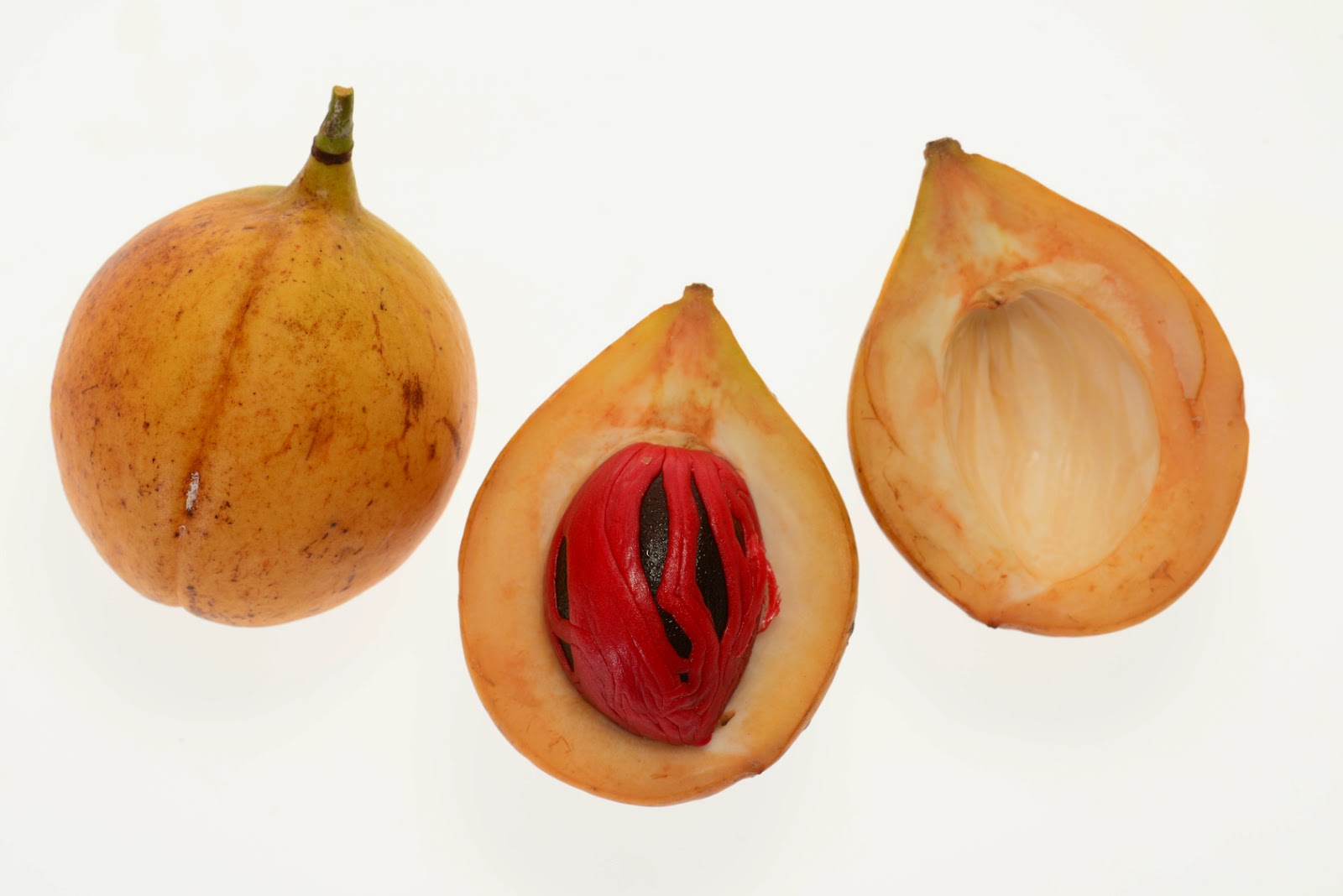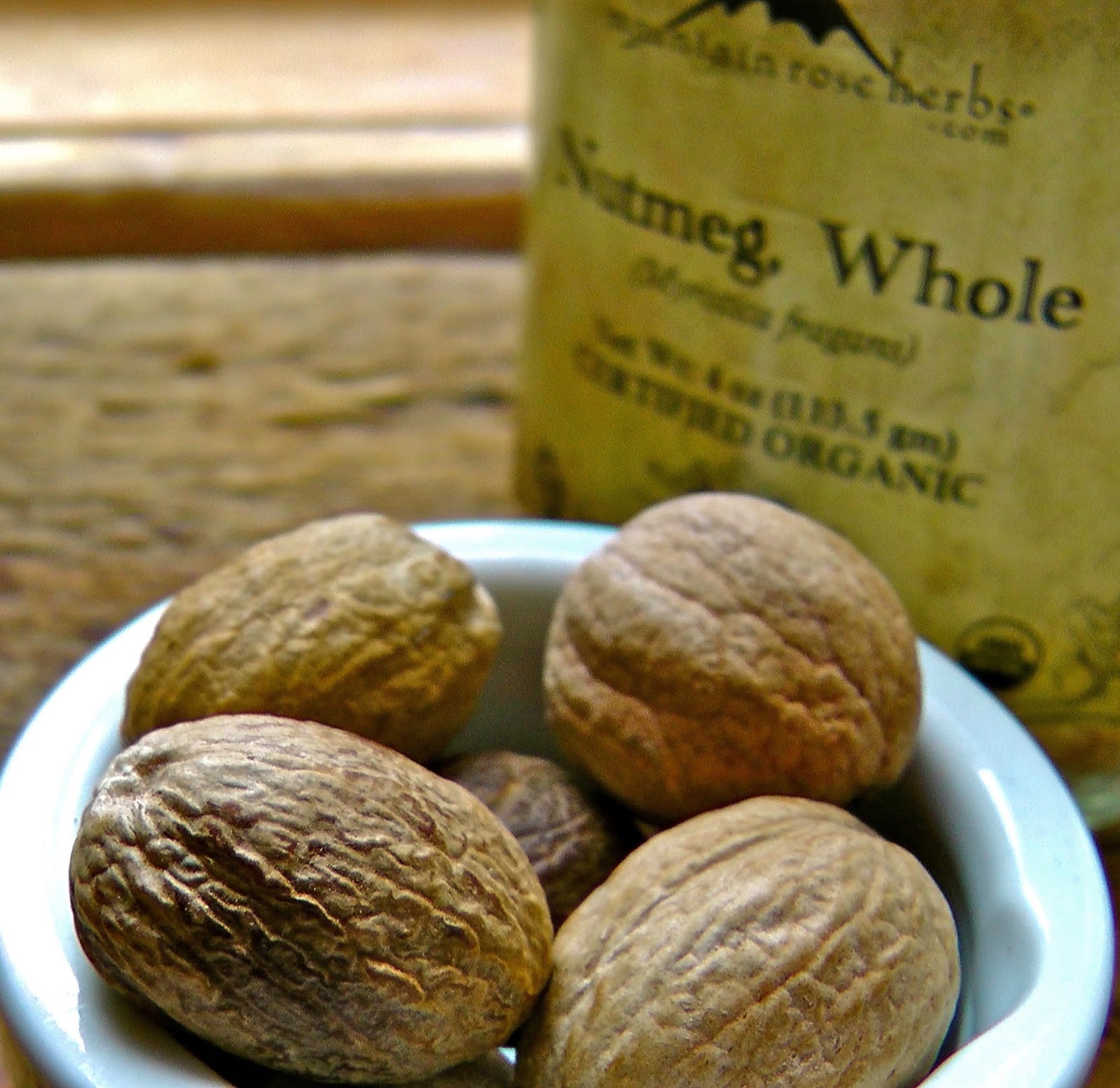Get weekly tips, recipes, and my Herbal Jumpstart e-course! Sign up for free today.

Nutmeg Benefits
Share this! |
|
If a person eats nutmeg, it will open up his heart, make his judgment free from obstruction, and give him a good disposition. - Hildegard von Bingen writing about the benefits of nutmeg around 1151 AD
What is Nutmeg?
In
the Far East islands of Banda, once called the Spice Islands, a pigeon
devours a fleshy cream-colored fruit along with the large seed inside of
it. This aromatic seed remains unharmed and is eventually deposited
into the surrounding lush tropical forests.
The seed germinates in the rich volcanic soil and a tree begins to emerge. If this dioecious seed is female, it will produce its first fruit within 9–12 years. It produces about 2,000 fruit per year after about 20 years. Eventually the tree will reach to around 20 feet high and live for 3 quarters of a century.
When you hold nutmeg in your hand, you are truly holding a special treasure. That sweet and aromatic spice is often taken for granted as a “pumpkin” spice to be used occasionally in baking during the holidays. But the nutmeg tree and its fruit is a powerful medicinal herb.
Nutmeg has a rich and sometimes sad history. Its fruit, seed, and mace have been highly prized as both food and medicine for thousands of years. Europeans became so obsessed with this plant that atrocities were committed and blood was shed.
This article will briefly look at the troublesome history of nutmeg, nutmeg benefits, the medicinal properties of nutmeg and will also answer some common questions about nutmeg, such as: Does nutmeg make you sleep? How much nutmeg is safe?
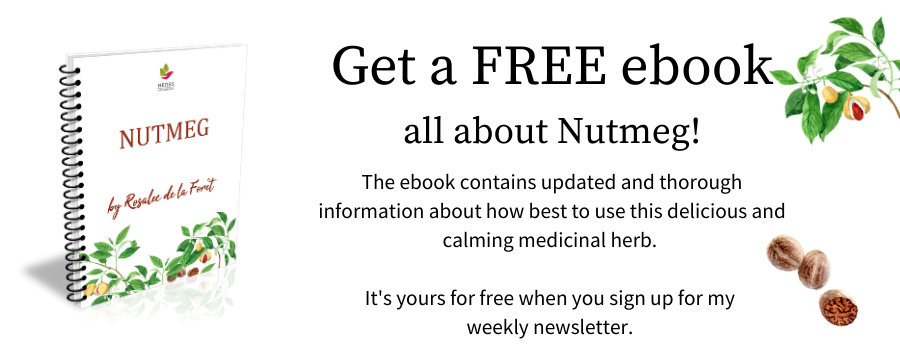
History of Nutmeg
Nutmeg grows natively in the Banda Islands, North of Australia. For thousands of years the Banda people harvested the fruits of the nutmeg tree to use the fruit, the mace, and the nutmeg seed as food and medicine. They also traded nutmeg extensively with surrounding islands.
It’s easy to love this sweet and aromatic spice, and when it arrived in Europe through the spice route, Europeans fell head over heels for it. Not only did it taste delicious, it was believed to stop the plague and was used as a hallucinogen.
When the European spice trade over land was stopped in 1453 (due to the successful siege of Constantinople by Mehmed II), the race to win the spice trade over the seas began. European countries braved the open sea to discover a route to the East Indies and the treasure of spices growing there. To get an idea of how lucrative this endeavor was, the price of nutmeg was so high in Europe it is said that one small bag of nutmeg seeds could guarantee a life of retirement for a sailor.
The Portuguese were the first to make it to the Banda Islands, but it would be the Dutch who would eventually take control of the islands through an ill-fated treaty and then horrific violence and force against the Banda people.
Years later, after many battles had been fought, the Dutch would sit down with the British in 1667 to create a treaty to formally settle their differences. The Dutch wanted control of one of the small islands in the Banda Islands that the British had managed to gain control of. In return, the British wanted the island New Amsterdam located in the “new” Western world. The treaty was signed and that is how the British traded nutmeg for what is now called Manhattan.
Much of the history I’ve read about nutmeg and the spice wars focuses on the skirmishes between European countries. But while Europeans were satisfying their greed, the Banda people were all but destroyed. Despite their resistance, they were overrun and scattered throughout Polynesia.
In time, the French were able to smuggle enough nutmeg seeds from the Banda Islands to grow their own nutmeg farms in tropical regions, thus breaking the Dutch monopoly. Today a lot of the nutmeg we buy in the US is grown in Grenada.
Mace and Nutmeg
There are two spices that come from the nutmeg tree: mace and nutmeg.
Mace is a beautiful and bright red skein located around the nutmeg seed. It is used in cooking and as a medicinal spice.
Nutmeg is the brown seed located inside of the mace. This article is mainly focused on using the nutmeg seed.
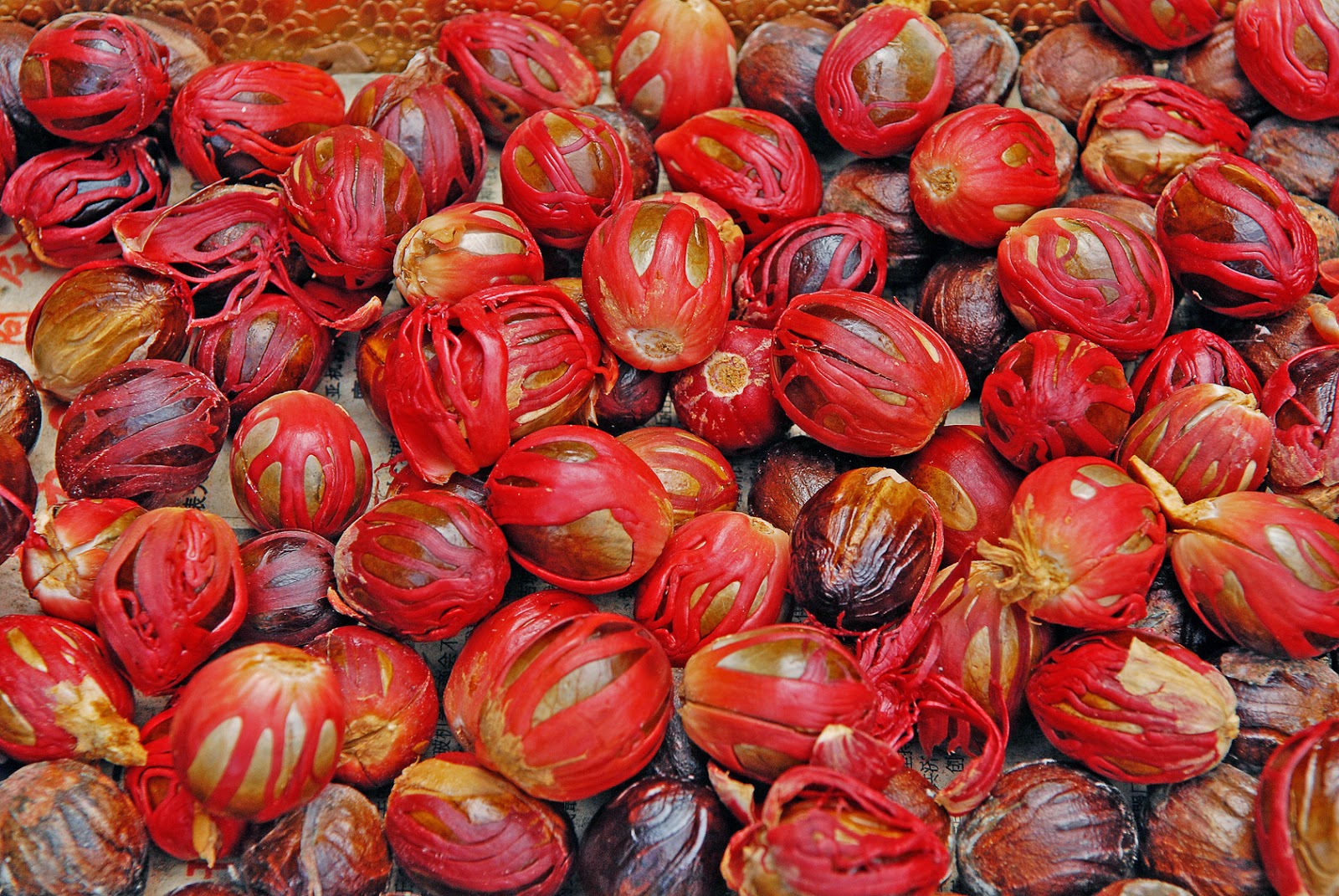
Nutmeg Benefits
Nutmeg is commonly used as a culinary spice. The US imports many tons and millions of dollars of nutmeg from around the world. Most of this is ground and sold for use in baking, especially during the holidays.
But nutmeg is more than a simple culinary spice. The health benefits of nutmeg include reduced anxiety, sound sleep, better digestion, and help for colds and the flu.
Does Nutmeg Make You Sleep?
Nutmeg is one of our most powerful herbal sedatives. I learned how to use nutmeg for sleep from my mentor KP Khalsa and have used it to help countless people get reliable sleep.
A folk remedy for sleep is warmed milk with nutmeg. Yum!
However, when using nutmeg for serious insomnia, it’s used in larger amounts and in a specific way.
Nutmeg takes 2–6 hours to go into effect, so it has to be taken hours before bedtime. The sedative effects of nutmeg last for 8 hours, so the effects need to go into place 8 hours before a person needs to be awake. If someone took nutmeg at 10 p.m., then its effects could last well into the morning hours.
The amount taken is anywhere from 1 to 10 grams. Because nutmeg can create unwanted effects at larger dosages, it’s important to start low and slowly increase the amount.
Using nutmeg for insomnia can help to reset sleep patterns. However, there are usually other underlying reasons for the insomnia that also need to be addressed.
Nutmeg Benefits for Digestive Issues
Nutmeg is a warming and aromatic spice that can relieve many uncomfortable digestive symptoms. It’s commonly used for bloating and gas. It can also relieve diarrhea and is commonly used with children.
Aromatic culinary spices used in our food are a wonderful way to prevent common digestive problems. Nutmeg can also be taken as an herbal chai mixed with other spices like ginger, cinnamon, and cloves to relieve digestive discomfort.
Nutmeg Benefits for Colds and the Flu
Several historical texts from the Eclectics mention using nutmeg to relieve cold and flu symptoms. I haven’t tried this myself, as I am more likely to reach for elderberry and garlic, but wanted to include this quote from Felter here. If you use nutmeg for colds or other upper respiratory symptoms, I’d love to hear about it in the comments!
Grated upon a larded cloth and applied warm we have found it to give prompt and grateful relief in soreness of the chest attending an acute cold or the beginning of acute respiratory inflammation. - Harvey Wickes Felter, The Eclectic Materia Medica, 1922
Nutmeg Benefits as an Aphrodisiac
Nutmeg is often called an aphrodisiac and is added in small amounts to herbal aphrodisiac potions. Aphrodisiac is a troublesome term since it can give the illusion that people take it and suddenly become the plot of a cheesy '80s film in which they fall helplessly in love with the first person they see.
In reality, an aphrodisiac can have many different methods to slightly influence a romantic evening. For example, someone who is really stressed and unable to relax might find a relaxing nervine to be an aphrodisiac because it relieves their tension. Someone who is suffering from chronic sleep debt and is tired all the time may find that an adaptogen helps them get the rest they need, leaving them more refreshed and open to expending energy in the bedroom.
Nutmeg is a delicious herb that is also relaxing and calming. Don’t expect it to be the magical secret ingredient in your love potion; however, if someone has a lot of anxiety, stress, or perhaps insomnia, nutmeg may be able to support relaxation and sleep. Being well rested and calm can undoubtedly help to remove any physical barriers to sex.
Or, as Hildegard von Bingen points out, nutmeg can get rid of bitterness in your heart and make you more pleasant and cheerful.
Take some nutmeg and an equal weight of cinnamon and a bit of cloves, and pulverize them. Then make small cakes with this and fine whole wheat flour and water. Eat them often. It will calm all bitterness of the heart and mind, open your heart and impaired senses, and make your mind cheerful. - Hildegard von Bingen around 1151 AD
Nutmeg can also support male sexual health and has been used for benign prostatic hyperplasia (BPH), impotence, and premature ejaculation.
Like
valerian, nutmeg is a versatile herb with many other benefits. It has
been used in Ayurveda throughout the history of that healing system, for
a diverse range of conditions. It is a warming agent, a good
cardiovascular tonic, helps lower blood pressure, increases circulation
and enhances digestion. It is also a useful tonic for men, recommended
as part of treatment for benign prostatic hyperplasia (BPH),
infertility, impotence and premature ejaculation. It has been used as an
aphrodisiac.
- Karta Purkh Singh Khalsa
Nutmeg Benefits for Hypertension
Nutmeg has hypotensive abilities and can reduce blood pressure. I haven’t seen modern herbalists using nutmeg for that specific purpose. However, it is something to keep in mind when using medicinal amounts of nutmeg in someone who tends to have low blood pressure.
Nutmeg Uses
Walk into any grocery store and you’ll find nutmeg in the spice rack. While this nutmeg may give your apple pie a nice taste, this isn’t medicinally potent nutmeg.
If you want the best quality nutmeg, then buy the whole nutmeg seed and grate it up as needed. You can use a cheese grater for this or buy a specialty nutmeg grater.
Once ground, nutmeg quickly loses its potency. I use up my freshly ground nutmeg immediately to within a week.
If you don't want to deal with grating whole nutmeg, then I recommend buying high quality nutmeg powder from my affiliate partner, Mountain Rose Herbs. Buy it in small quantities and use it up quickly.
In Chinese medicine nutmeg is commonly roasted, which is said to reduce any toxicity.
Nutmeg is used in many sweet and savory dishes. It is traditionally drank in warm milk to promote sleep.
How about a delicious nighttime drink for the fall, made from ½ water and ½ milk, boiled with ginger, cardamom and nutmeg?
- Karta Purkh Singh Khalsa
Read more about nutmeg's daily uses in the kitchen in Sue Kusch's article here.
How Much Nutmeg is Safe?
I’m going to warn you about Googling information about nutmeg. What will quickly pop up are overblown news stories about teenagers using nutmeg to get high, which then lead reporters to describe nutmeg as being toxic.
Nutmeg, like anything else in this world, can be toxic when taken in high enough dosages. Taking over 6 grams of nutmeg will be a powerful sedative. If you do this during waking hours, you may feel extremely fatigued. I’ve recommended up to 10 grams of nutmeg for insomnia and didn’t see any ill effects (besides the much-needed sedation). The Botanical Safety Handbook does not recommend over 5 grams. This doesn’t match my personal experience with this herb, but I do think it is wise to be cautious with large dosages unless working with an experienced practitioner.
Taking as much as 30 grams or 1 ounce of nutmeg can bring on uncomfortable symptoms, including vomiting, headache, and hallucinations. The last reported death from nutmeg poisoning was in 1908 (Botanical Safety Handbook).
I do not recommend medicinal doses of nutmeg during pregnancy. I have seen nursing moms take medicinal doses of nutmeg without any problems, but nutmeg has not been proven safe for use during pregnancy or breastfeeding.
Botanically Speaking
Nutmeg spice is the seed from the fruit of a large evergreen tree that grows in tropical regions.
The tree has evergreen oblong leaves.
The flowers are cream colored.
The tree is dioecious, meaning it has both female and male plants. The female plants produce the cream-colored fruit. The fruit can be prepared and eaten.
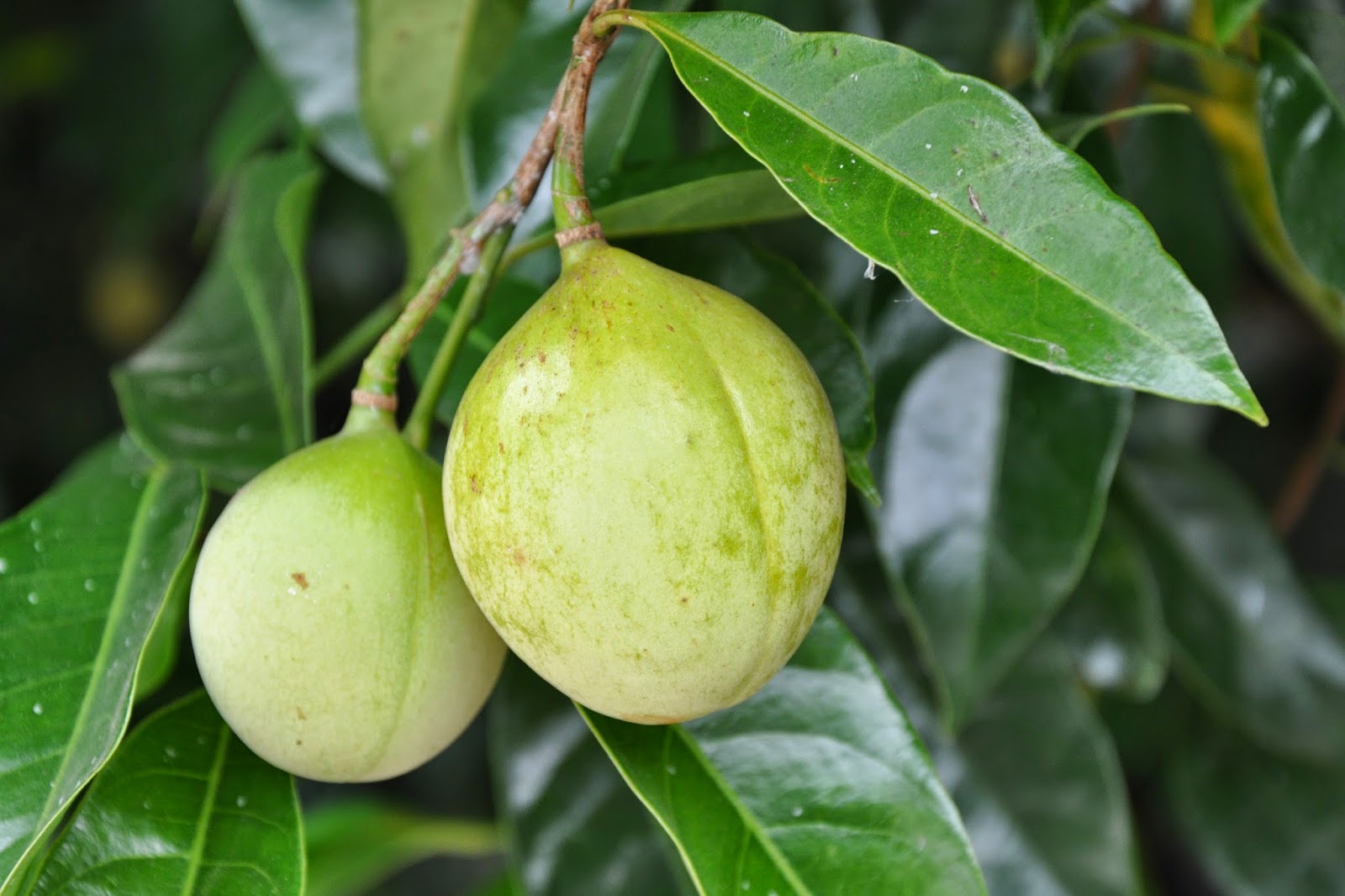
The delicate mace that surrounds the nutmeg seed can be dried and used as a spice and as medicine.
The nutmeg seed is about the size of a rounded quarter, brown and hard.
Few
cultivated plants are more beautiful than nutmeg-trees. They are
handsomely shaped and glossy-leaved, growing to the height of twenty or
thirty feet, and bearing small, yellowish flowers. The fruit is the size
and colour of a peach, but rather oval. It is of a tough fleshy
consistence, but when ripe splits open, and shows the dark brown nut
within, covered with the crimson mace, and is then a most beautiful
object. Within the thin hard shell of the nut is the seed, which is the
nutmeg of commerce. The nuts are eaten by the large pigeons of Banda,
which digest the mace but cast up the nut with its seed uninjured.
- Alfred Russel Wallace, December 1857, May 1859, April 1861
Summary for Nutmeg Benefits
Nutmeg is a humble-looking brown seed with a delicious sweet and aromatic taste. It can be used in sweet and savory dishes, from garam masala to eggnog to pumpkin bread.
Nutmeg is also an important medicinal spice most notably used to address a variety of digestive complaints and insomnia.
Hundreds of years ago, the fervor around nutmeg was so strong that Europeans fought battles and braved the high seas for control over this tree and its fruit. It’s an amazing treasure to hold fair trade, organic nutmeg in my hand and think about all the lives lost and the riches won over this humble little seed.
Further Resources on Nutmeg Benefits
- The Way of Ayurvedic Herbs by Michael Tierra and Karta Purkh Singh Khalsa
- American Herbal Products Association's Botanical Safety Handbook
- Physica by Hildegard von Bingen
- The Eclectic Materia Medica by Harvey Wickes Felter (1922)
This article was originally written for HerbMentor.com

Rosalee is an herbalist and author of the bestselling book Alchemy of Herbs: Transform Everyday Ingredients Into Foods & Remedies That Healand co-author of the bestselling book Wild Remedies: How to Forage Healing Foods and Craft Your Own Herbal Medicine. She's a registered herbalist with the American Herbalist Guild and has taught thousands of students through her online courses. Read about how Rosalee went from having a terminal illness to being a bestselling author in her full story here.
